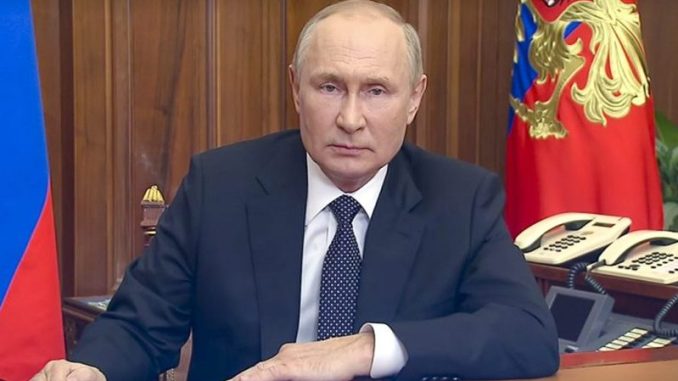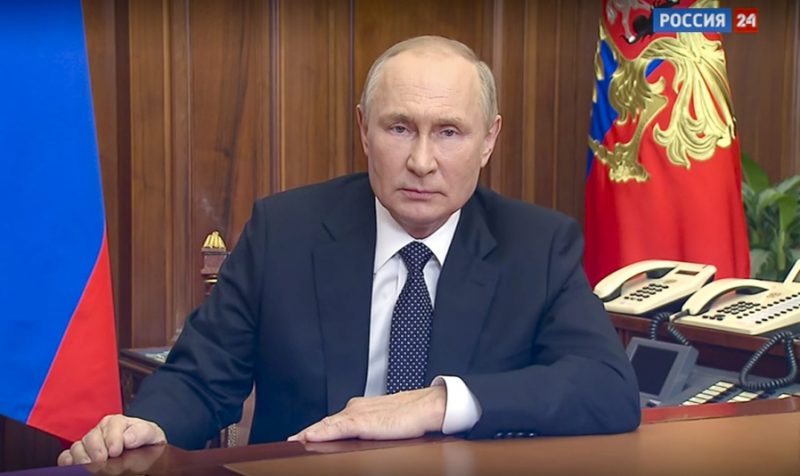

OAN Roy Francis
UPDATED 8:21 PM – Wednesday, March 22, 2023
Russian President Vladimir Putin said that he will respond “accordingly” to the United Kingdom’s plans to send ammunition to Ukraine which contain depleted uranium (DU) on Tuesday.
Annabel Goldie, a U.K. defense minister, said that “alongside our granting of a squadron of Challenger 2 main battle tanks to Ukraine, we will be providing ammunition including armour piercing rounds which contain depleted uranium.”
She went on to say that the depleted uranium armour piercing rounds are “highly effective in defeating modern tanks and armoured vehicles.”
This caused Putin to respond to the statement by saying he will “respond accordingly” since the “collective West is already using weapons with a nuclear components.”
“[The U.K.] announced not only the supply of tanks to Ukraine, but also shells with depleted uranium,” Putin told reporters. “I would like to note that if all this happens, then Russia will have to respond accordingly. The collective West is already starting to use weapons with a nuclear component.”
Russian officials did not expand on the threat made by Putin. Maria Zakharova, the Russian Foreign Ministry spokesperson, condemned the U.K.’s plan to provide such munitions to Ukraine, comparing it to a “Yugoslav scenario,” in which NATO had utilized munitions with depleted uranium.
“These shells not only kill, but infect the environment and cause cancer in people living on these lands,” she claimed.
According to Reuters, Russian Defense Minister, Sergei Shoigu, increased the threat of a nuclear response by saying that there are now fewer steps leading to a “nuclear collision” between Russia and the West.
“Another step has been taken, and there are fewer and fewer left,” he said.
Ammunition with depleted uranium are considered still radioactive, however, they are used in armor-piercing shells due to the fact that it enhances their armor-piercing capability.
According to the European Union (EU) the impact of using such munitions found that “residues from combat zones show generally low concentrations of the metal, within the range of naturally occurring uranium, though there may also be a small number of ‘hot spots’.”
“All uranium isotopes are radioactive. DU is appreciably less radioactive – usually around 40% less – than unprocessed uranium,” the EU said. “This means radiation hazards from uranium only arise from breathing in dust, eating or drinking contaminated food or water, or from shrapnel entering the body. Urine samples from serving soldiers and from civilians living in areas where DU ammunition has been used, typically indicate very low levels of DU exposure.”
The United Nations Environment Program said that depleted uranium is a “chemically and radiologically toxic heavy metal.”
The United States Department of Veteran Affairs also found that depleted uranium still poses a “health hazard” if it is entered into the human body through shrapnel, or inhalation.
The Campaign for Nuclear Disarmament (CND), an anti-nuclear organization, has condemned Britain’s decision to send such ammunition to Ukraine. The organization said that the move would be an “additional environmental and health disaster for those living through the conflict.”
“CND has repeatedly called for the U.K. government to place an immediate moratorium on the use of depleted uranium weapons and to fund long-term studies into their health and environmental impacts,” CND General Secretary Dr. Kate Hudson said.
However, Rebekah Koffler, who had previously served as a Defense Intelligence Agency intel officer for Russian doctrine and strategy, said that these kinds of weapons are common in modern warfare. She also said that Moscow is using rhetoric to “confuse the audience.”
“Depleted uranium is used by the U.S. and NATO in ammunition to enhance its destructive power, to pierce armor. But the Russians have started using it as well,” she said. “As of approximately 2018-2019, in their T-80BV main battle tank fires depleted uranium shells. Putin is trying to confuse the audience, to find a pretext for additional escalatory actions in Ukraine.”
Putin made the remarks during Chinese President Xi Jinping’s visit to Moscow, a visit meant to signify the strong relation between the two leaders, as well as discuss an end to the conflict in Ukraine.
Stay informed! Receive breaking news directly to your inbox for free. Subscribe here. https://www.oann.com/alerts

